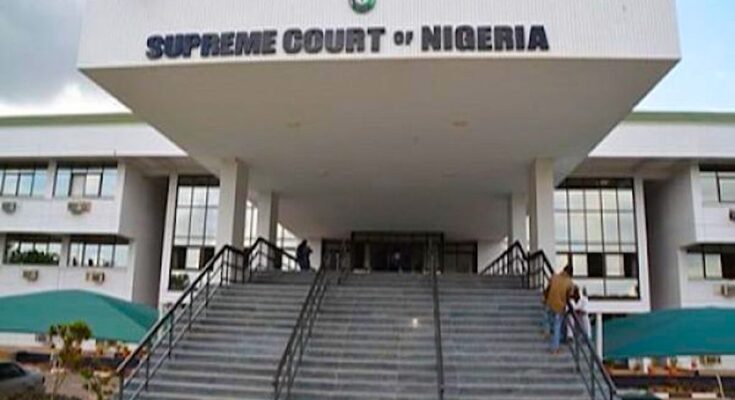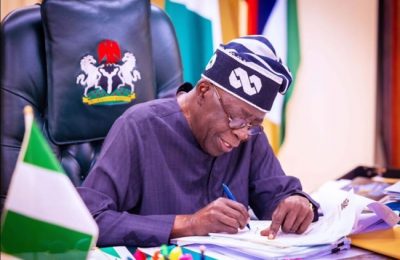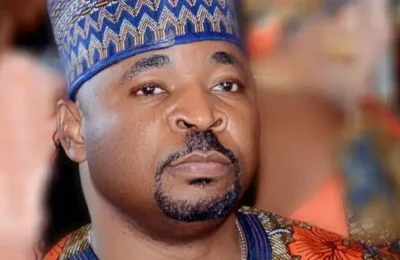LANRE ADEWOLE examines dissimilar precedents of the apex court in similar political cases and how the unevenness impacts the very consequential litigations on the presidential election.
Last week Tuesday, when the Supreme Court of Nigeria, restored the mandate of Osun State governor, Ademola Adeleke, the attention of the political class and the Bar, was locked on the reasoning of the apex court.
Seen as a low-hanging precedent that the apex court can reach out to, in resolving the multiple litigations over the 25 February 2023 presidential election, litigating and defence teams, particularly the camp of the president-elect, Bola Tinubu, had gone to town, with different interpretations of the conclusion reached by the apex court, on the Osun appeal and how, it fed perfectly into their cases.

Festus Keyamo, a Silk, Minister of State for Labour and Productivity and a surrogate of the president-elect, had warned the opposition celebrating the judicial defeat of his ruling APC in Osun, that the judgement was a double-edge sword that would soon come back to hurt those celebrating, especially supporters of the Peoples Democratic Party and Labour Party.
Presidential candidates of the two leading opposition parties are currently before the Court of Appeal, serving as the Presidential Election Petition Court, seeking to invalidate the election of the APC standard-bearer, Tinubu. Regardless of the outcome at the court of first instance, all the parties, both petitioners and defendants, are expected to land before the apex court, for final adjudication and Keyamo, believes that the Osun appeal had set the tone for Tinubu’s victory, while trying to align the case mounted against Adeleke’s election by immediate Osun governor, Gboyega Oyetola with the issues raised in the petitions of Atiku Abubakar of PDP and Peter Obi of Labour.
Keyamo also saw an alignment in the defence of Adeleke that won him victory at the Court of Appeal and the Supreme Court and that of Tinubu, against the issues raised by the petitioners.
Keyamo and others who are pointing to Adeleke’s victory as the precursor to Tinubu’s, hold that their principal’s case is already served by the most recent precedent.

What Supreme Court said
Delivering judgment in Oyetola’s appeal, Justice Emmanuel Agim, who read the lead judgment, held that the former governor and APC failed to tender relevant materials such as the BVAS from the 744 polling units in the state, INEC voters’ register or Form EC8A, showing the number of votes cast at each unit, saying “It is glaring that the appellant (Oyetola) did not provide in evidence, any BVAS, but sought to prove over-voting by means of a report of examination of INEC’s database or backend server.”
The apex court further held that the information from the BVR relied on by the petitioners, was not a direct record of the number of accredited voters but third-hand evidence derived from the database which is second-hand evidence derived from transmissions from the BVAS.
Justice Agim noted that the information at the backend server might not be accurate because the BVAS might fail to transmit records for several reasons, including poor internet connection, loss of battery power, and failure of INEC officials, to properly press the submit button, among others.
“So the database or any extract of it contains only what is transmitted from the BVAS to it and therefore, cannot be a complete and accurate record of the information in the BVAS,” Agim added.
He noted that no law requires presiding officers to transmit the number of accredited voters or accreditation of the polls to the database or backend server of INEC by BVAS, saying, “the case of the petitioners that the presiding officers were bound to instantly or on-the-spot transmit the number of accredited voters in the BVAS to the backend server of INEC, has no support. In the light of the foregoing, I hold that it is the record in the BVAS machine of the accredited voters or a certified true copy of an INEC certificate of that record for each polling unit that can prove the number of accredited voters in a polling unit on the day of the election and nothing else.”
The court, equally discountenanced the argument that voters’ register was not relevant, saying INEC’s regulations for the conduct of elections and the electoral act, made the register relevant in voter accreditation and is to be used as well with the BVAS machine.
“It is glaring from the foregoing that the appellants did not adduce relevant admissible evidence to prove non-accreditation of voters, improper accreditation of voters and over-voting. By virtue of section 131 and section 133(1)(2) of the evidence act, the appellants had the primary legal burden to prove the facts asserted by them in their petition. The court of appeal correctly found that the appellants failed to prove grounds two and three of their petition and correctly allowed the appeal on those grounds to set aside the decision of the tribunal” he ruled.
Precedents and antecedent
With the position of the apex court expressly stated, it would seem a sweeping verdict had already been given on Atiku and Obi’s petitions being heard at the Court of Appeal, since lower courts are bound by the precedents of superior courts, though the recent era of embarrassing conflicting orders by courts of coordinate jurisdictions in Nigeria, would seem to have made nonsense of the time-honoured principle in the legal/justice system.
Strangely however, the apex court will appear to be the more guilty party in sidestepping its own precedents and its unpredictability when it comes to political cases amid past pronouncements, is what is keeping certainty away from the calculations being made by parties in the presidential election disputes.
Not even Keyamo, would come out boldly to say the apex court verdict would go the way of his principal, using the Osun judgement as a template.
Adeleke’s lead counsel, Dr. Onyechi Ikpeazu, SAN, who is also the counsel to Obi of Labour Party, didn’t also come out of Adeleke’s successful appeal, boasting that he had found the winning formula to get Obi to Aso Rock.
The U.S trained lawyer, is obviously a veteran of election petition matters, especially marathon ones like NGIGE V OBI, reported in (2006) which brought Obi to office as Anambra governor, and despite the deep insight that ADELEKE V OYETOLA must have afforded him, he had refrained from being categorical about repeating the Anambra governorship feat for Obi.
Speaking on the Obi case, he said, “I’m sure we are going to put up the best and we hope that in the end, there will be a fair evaluation of our evidence.
“My role as a lawyer is to do the best for my client based on the available evidence and at the end, if we succeed, it is by the grace of God. The other side will also be seeking the grace of God.
“But the good thing is that we hope that Nigeria will be better for it.”
Ikpeazu’s resort to the spiritual will make sense to those following Supreme Court on adherence to own precedents.
On 20 September 2016, the apex court affirmed the election of Yahaya Bello as the newly-minted governor of Kogi State.
A seven-man panel of the court, dismissed the appeal by James Faleke, the deputy governorship candidate of Abubakar Audu, who died before the election result was announced and was substituted in the supplementary election by Bello.
Both Bello and Faleke are of the All Progressives Congress but Faleke had turned down another joint ticket with Bello, with the eventual winner going into the supplementary contest, without a valid running mate, after Faleke formally wrote to the Independent National Electoral Commission (INEC), withdrawing his nomination.
In dismissing Faleke’s appeal as well as the appeals of then-defeated governor, Idris Wada of PDP, ADC and Labour Party, the apex court established the precedent that a candidate could go into an election the way Bello did, despite the provisions of section 187(1) of the 1999 Constitution of the Federal Republic of Nigeria which mandates a running mate.
The apex court also held in the Faleke appeal that he had no locus to challenge Bello’s nomination by APC to replace Audu, as he (Audu) wasn’t the governor-elect when he died and all votes in the election, belonged to political parties and not the candidate who contested on their platforms.
Similar judicial sentiment by the apex court had worked for former Rivers governor, Rotimi Amaechi when he was crowned the governor of the state on 26 October, 2007, despite not being on the ballot for the election.
The court, while ruling in an intra-party squabble, held that Amaechi was the lawful candidate of the Peoples Democratic Party in the state and had the legal right to inherit all the votes cast for the original winner, Celestine Omehia, to become governor.
In what was described as 360-degree justice, the court held that the votes Omehia earned, were PDP’s and since Amaechi, was the lawful candidate, those votes automatically go to him.
It was the first time a governor would go into office without standing for election in Nigeria.
Like Bello, Amaechi also went into office without a running mate and both had to choose their deputies after becoming governor. While Bello chose Simeon Achuba who was screened and cleared by the Kogi State House of Assembly, Amaechi chose Tele Ikuru.
The precedent however worked differently in the outlier 2019 Bayelsa governorship election. David Lyon of APC who won a landslide election, was sacked by a five-person panel of the court, led by now-retired Justice Mary Odili, barely 24 hours to his swearing-in, because of his flawed running mate, Biobarakuma Degi-Eremienyo, with the court insisting that a joint ticket shares same fate.
Unlike Rivers and Kogi, APC didn’t retain Lyon’s 352,552 votes. They were deemed a waste, clearing the path for PDP’s Duoye Diri to move into the government house, with 143,172 votes and wins in two out of eight local governments.
Unlike Rivers and Kogi, the running mate in Bayelsa APC’s primary, wasn’t called upon, to take the place of Lyon.
While Amaechi and Bello could do without deputies, to secure their governorship, Lyon, had to carry the cross of his running mate, because the Constitution says the nomination of one is invalid, without the other.
Practically everything that worked in Bello’s favour, worked against Lyon and both cases are precedents of the apex court, till date.
READ ALSO FROM NIGERIAN TRIBUNE







